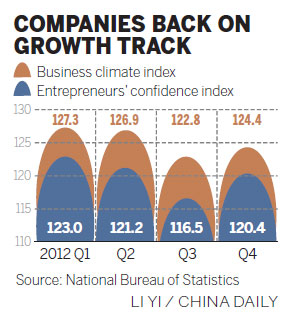Nation's business confidence bounces back in fourth quarter

China's business confidence in the fourth quarter rebounded for the first time in a year, showing that earlier fears of an economic hard landing have largely faded while firms in all sectors are re-gearing for growth.
The National Bureau of Statistics, which surveyed 21,000 enterprises across eight industries, said China's business climate index, an important measure of macro-economic outlook, rose 1.6 points to 124.4 during the three months ended Dec 31.
The index, with a scale from zero to 200, suggests economic expansion with a reading above 100. The economic slowdown has seen the reading fall below 130 since 2012, after hovering between 130 and 138 in 2010 and 2011.
Results of a separate study by the bureau, tracking entrepreneurs' confidence, showed a similar pattern, bouncing back to 120.4 from 116.5. Both indicators marked mild recoveries from the year's lowest readings in the third quarter, suggesting new market buoyancy has put companies back on the growth track.
Meanwhile, industrial production growth reached 10.3 percent, quickening 0.2 percentage points month-on-month from November.
"We have noticed a sense of optimism and it has started to proliferate," said Liu Ligang, chief China economist at the Australia and New Zealand Banking Group Ltd in Hong Kong.
"Steady and moderate economic recovery has continued since October. Besides, the accelerated deployment of the bond market in May has given companies easier access to capital," he told China Daily.
The index advance was led by the information and communications technology sector, which posted 144.4 points.
The result falls in line with the latest Forbes study that identified 30 percent of the promising businesses in China as belonging to the ICT sector.
PPLive Co Ltd, an online TV media company with 300 million registered users, saw a "historic surge" in revenue last year and is poised to file an initial public offering under favorable market conditions, Chief Executive Officer Tao Chuang said.
"I am hoping to see signs of improvement in the second half of 2013, notably in the capital market. I expect more mergers and acquisitions in the industry and better opportunities for investment," he said.
Real estate firms saw the biggest rebound, of 5.8 points, though the sector's overall reading of 113.8 was among the lowest.
The central government's tight grip on home mortgages and purchase limits have cooled property trading, but the first year-on-year pickup in nine months was recorded in December, according to Beijing-based real estate research institute the China Index Academy.
Liu Xi, real estate specialist at Career International Consulting, a recruiting and human resources management firm, said:"We have spotted this warming trend since the second half of 2012, because China's improved economic outlook and the slowed release of new property fueled market expectations of further price hikes."
According to a January survey by the company, 70.4 percent of 79 real estate companies interviewed had increased hiring in 2013. Two-thirds of respondents said they were primarily looking for salespeople, followed by project managers and industrial designers.
The results also suggested that State-owned companies were the least concerned about the downturn and, as a result, were leading the rebound.
Bright Food Group Co, the country's second-largest food maker by revenue, is expecting revenue in 2013 to surpass 100 billion yuan ($16 billion) after completing two overseas acquisitions in the past two years.
Company spokesman Pan Jianjun said: "Generally speaking, the gloomy world economy offers a golden opportunity for us to reach out to overseas assets. But it also brings about challenges in managing them in the long run."
He said boosting domestic consumption - a government pledge to create new growth - is a policy bonus for Bright Food.
"Domestic growth has quickened and we can definitely count on double-digit growth," Pan said.
hewei@chinadaily.com.cn
(China Daily 01/19/2013 page9)








